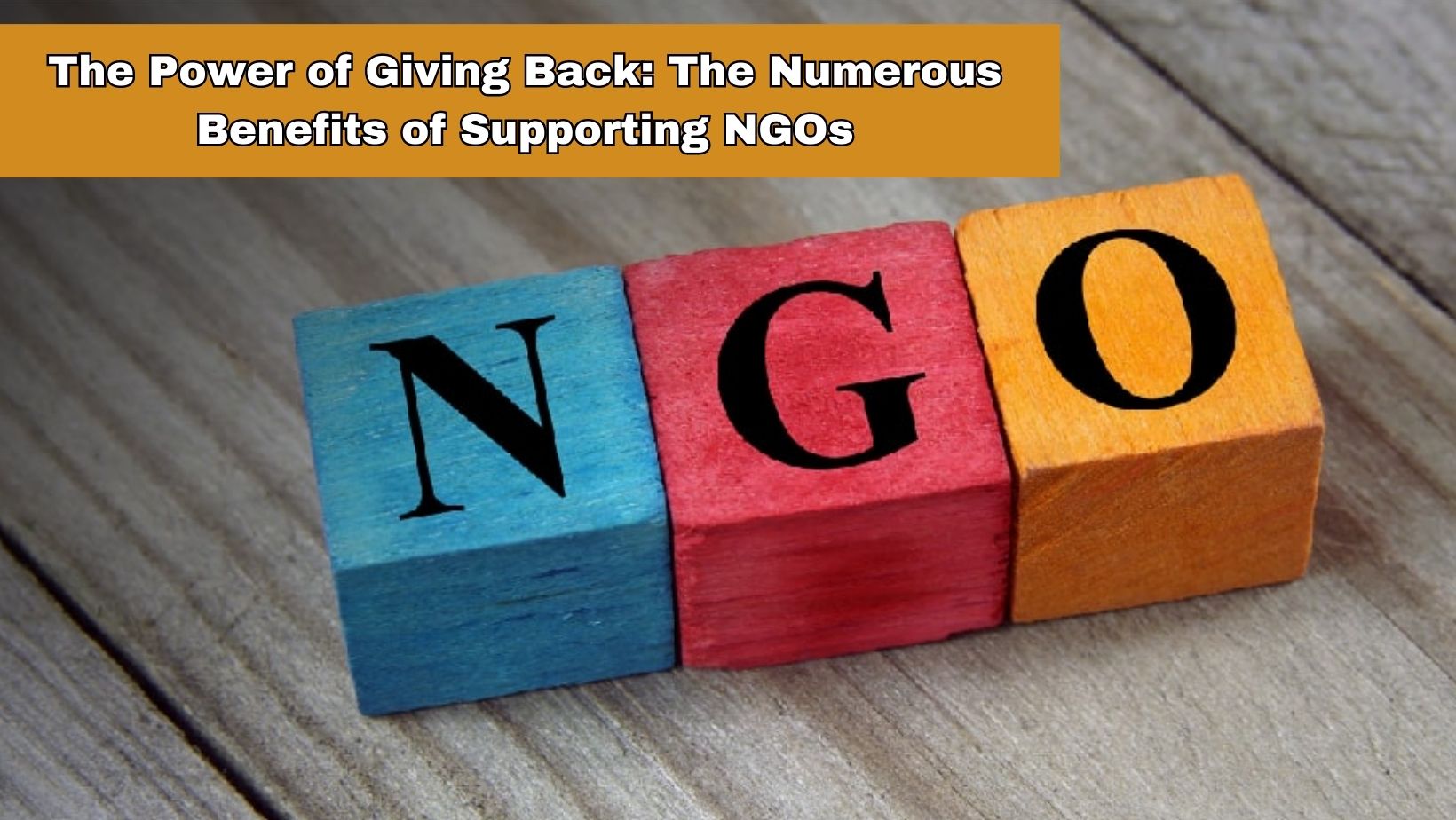Amid a world where personal aspirations and material pursuits hold sway, the potency of bestowing support upon Non-Governmental Organizations (NGOs) unveils a formidable catalyst that transcends self-interest, giving rise to profound and transformative change. NGOs occupy a pivotal role in addressing an expansive spectrum of global concerns – spanning from societal and environmental dilemmas to humanitarian causes. Ranging from alleviating poverty and initiating healthcare endeavors to championing environmental preservation and facilitating educational campaigns, these dedicated entities labor tirelessly to weave a tapestry of positive influence across communities and the wider world. Yet, the benefits aren’t limited solely to those who directly receive their endeavors; those who opt to champion NGOs also harvest a rich harvest of advantages that extend well beyond financial contributions.

The Power of Giving Back: The Numerous Benefits of Supporting NGOs
-
The Transformative Impact of NGOs
NGOs have demonstrated repeatedly their aptitude for catalyzing transformative shifts. Embracing NGOs offers a profound advantage – the opportunity to actively participate in this constructive metamorphosis. Whether it entails granting access to pristine water in isolated villages, extending vital healthcare provisions to marginalized communities, or championing the cause of human rights and societal equity, NGOs emerge as driving forces propelling advancement. By rallying behind these organizations, individuals seamlessly integrate into a broader collective, assuming crucial roles in a shared movement that not only serves the greater good but also leaves an indelible imprint for generations to come.
-
A Sense of Purpose and Fulfilment
Engaging in the noble act of endorsing NGOs exerts a deep influence on the emotional and psychological wellness of individuals. Academic studies reveal that partaking in acts of altruism and philanthropy has the potential to elevate sentiments of joy, contentment, and holistic well-being. As individuals dedicate their time, assets, or skills to causes that resonate with their beliefs, a profound sense of intent emerges – one that surpasses individual achievements. This overwhelming fulfillment stems from the realization that one’s contributions hold the power to effect change in the lives of others, thus enriching society as a whole.
-
Building a Stronger Community and Society
NGOs function as vital links that span the divides between various strata of society, effectively uniting individuals hailing from a multitude of backgrounds, all united by a shared mission: the cultivation of constructive transformation. Choosing to endorse NGOs seamlessly integrates individuals into a broader collective of kindred spirits, all ardently committed to akin causes. This shared objective fosters a prevailing sense of solidarity and camaraderie, which in turn cultivates resilient social connections and a more tightly knit societal fabric. As NGOs tirelessly strive to elevate marginalized communities and confront systemic hurdles, the collaborative endeavors of their advocates serve as building blocks for a world characterized by enhanced equity and inclusiveness.
-
Driving Innovation and Progress
Supporting NGOs goes beyond providing financial assistance; it also fuels innovation and progress. Many NGOs operate in dynamic and challenging environments, which require them to think creatively and adapt to evolving circumstances. As a result, these organizations often pioneer new solutions and approaches to complex problems. By aligning with NGOs and contributing resources, individuals can play a role in driving innovation that leads to sustainable solutions and systemic change. This collaborative process encourages the sharing of ideas, expertise, and resources, ultimately fostering an environment conducive to progress.
-
Expanding Perspectives and Cultural Understanding
NGOs operate on a global scale, addressing issues that span continents and cultures. Engaging with and supporting these organizations exposes individuals to a diverse range of perspectives, traditions, and challenges. This exposure cultivates cultural understanding, empathy, and a broader worldview. As individuals learn about different societies and their unique struggles, they become better equipped to navigate an interconnected world and contribute positively to global conversations. This expansion of perspectives enhances personal growth and enriches the ability to engage in meaningful cross-cultural interactions.
-
Driving Personal Growth and Skill Development
Backing NGOs also presents a fertile ground for nurturing personal evolution and honing skill sets. Numerous NGOs extend invitations for volunteer engagement, enabling individuals to invest their time and abilities in purposeful undertakings. This practical immersion can result in the acquisition of novel proficiencies, the refinement of preexisting aptitudes, and the fostering of leadership attributes. Whether the domain entails project management, effective communication, fundraising prowess, or community engagement, the diverse array of roles intrinsic to NGOs provides fertile terrain for skill enhancement. These competencies prove invaluable not solely within the organizational framework but also resonate across various facets of personal life and professional trajectory.
-
Fostering Responsible Global Citizenship
In an era of increasing interconnectedness, supporting NGOs contributes to fostering responsible global citizenship. Individuals who engage with these organizations understand the importance of addressing global challenges, regardless of geographic boundaries. This mindset encourages active participation in international discussions, cooperation, and collaborative efforts to tackle pressing issues such as climate change, poverty, and healthcare disparities. By supporting NGOs, individuals demonstrate their commitment to being responsible and engaged citizens of the world, contributing to a more just and sustainable future.
-
Catalyzing Local Empowerment and Sustainability
One of the often-overlooked benefits of supporting NGOs is their role in catalyzing local empowerment and sustainability. NGOs often work closely with communities to identify their unique needs, strengths, and resources. By involving local stakeholders in the decision-making process and collaborating on initiatives, these organizations empower communities to take charge of their development. This approach fosters a sense of ownership and agency, leading to sustainable, locally-led solutions that have a lasting impact. Supporting NGOs in these efforts not only helps communities thrive but also demonstrates a commitment to grassroots development and a belief in the inherent capabilities of people worldwide.
-
Advancing Education and Knowledge Sharing
Knowledge serves as the bedrock of advancement, and NGOs assume a central role in propelling educational prospects for underserved demographics. Countless NGOs are dedicated to enhancing the accessibility of quality education, particularly among marginalized cohorts like girls and children originating from economically disadvantaged circumstances. By rallying behind NGOs committed to education, individuals play an integral part in dismantling the cycles of impoverishment, promoting upward social mobility, and empowering the forthcoming generation with the essential resources required for triumph.
Conclusion
The advantages stemming from endorsing NGOs encompass a wide array of facets, intricately weaving a mosaic of influence that traverses realms including personal advancement, communal enhancement, worldwide responsibility, and the advancement of societal well-being. As individuals engage with and contribute to these organizations, they become threads in this intricate tapestry, each playing a unique role in creating a brighter and more compassionate world.
Read more – The Development Of Contest: Flourishing In A Hypercompetitive Scene
Read more – The Force of Schedule: Laying out Solid Propensities

